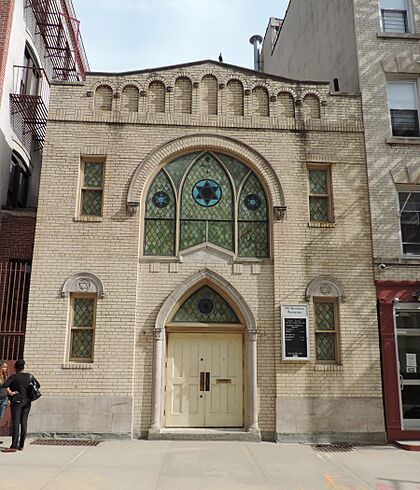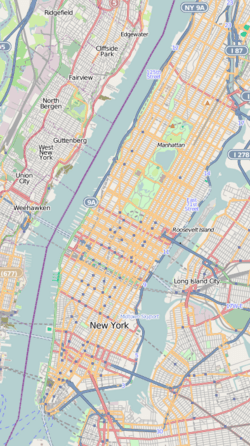Old Broadway Synagogue facts for kids
Quick facts for kids Old Broadway Synagogue |
|
|---|---|

Old Broadway Synagogue in 2014
|
|
| Religion | |
| Affiliation | Orthodox Judaism |
| Rite | Nusach Ashkenaz |
| Ecclesiastical or organizational status | Synagogue |
| Status | Active |
| Location | |
| Location | 15 Old Broadway, Manhattanville, Harlem, Manhattan, New York City, New York 10027 |
| Country | United States |
| Architecture | |
| Architect(s) | Meisner and Uffner |
| Architectural type | Synagogue |
| Architectural style | Gothic Revival |
| Date established | 1911 (as a congregation) |
| Completed | 1923 |
The Old Broadway Synagogue, also known by its official name Chevra Talmud Torah Anshei Marovi, is a special Jewish house of worship. It is located at 15 Old Broadway in the Manhattanville neighborhood of Harlem, part of New York City. This synagogue follows Orthodox Judaism, which means it observes Jewish laws and traditions very closely. The way they pray and conduct services is called Nusach Ashkenaz, a style common among Jews from Central and Eastern Europe.
The group of people who worship here, called the congregation, started in 1911. It was founded by Morris Schiff, an immigrant from Poland who lived in Harlem. At that time, many Jewish families lived in the area. As of 2011, the synagogue welcomed many different people from West Harlem. This included students from nearby colleges like Columbia University and Barnard College, and also from the Jewish Theological Seminary of America.
The synagogue building was finished in 1923. Because of its history and importance, it was added to the National Register of Historic Places in January 2002.
Contents
About the Synagogue Building
The Old Broadway Synagogue is found at 15 Old Broadway. This street is a rare leftover part of an old road in Manhattan called Bloomingdale Road. The building was designed in 1923 by architects Meisner and Uffner. It has a "vernacular" style, which means it looks like a typical building from that time and place.
How the Congregation Started
The congregation began with Jewish immigrants from Russia and Poland. They came to New York in the 1880s and moved to Central Harlem, then further west. At first, the members met in small shops or even in the back room of a bar. Later, they bought a house on Old Broadway. This house was then taken down to build the synagogue we see today.
Learning at the Synagogue
The synagogue also had an active Talmud Torah, which is a traditional Hebrew school. This school likely started when the congregation did and continued until the 1960s or 1970s. Important early rabbis, like Simon Glazer and Shepard Brodie, led the community.
Rabbi Jacob Kret's Influence
The synagogue is well-known because of its former rabbi, Jacob Kret. He was once the head of a yeshiva (a Jewish school for advanced religious study) in Poland. During World War II, Rabbi Kret was arrested and sent to a labor camp. After the war, he led a yeshiva for people who had lost their homes.
Rabbi Kret became the spiritual leader of the Old Broadway Synagogue in 1950. By then, many of the original families had moved away. So, Rabbi Kret invited Holocaust survivors who were moving to New York to settle near the synagogue. These survivors, many from Polish Hasidic backgrounds, helped fill the synagogue in the 1950s and 1960s.
Later, in the 1970s and 1980s, Rabbi Kret became a mashgiach. This means he supervised food to make sure it was kosher (following Jewish dietary laws) at the nearby Barnard College dining hall. He also taught Talmud to students at the Jewish Theological Seminary. Rabbi Kret had a big impact on many students from Columbia University, Barnard College, and the Jewish Theological Seminary until he retired from the synagogue in 1997. He passed away in 2007.
The Synagogue Today
Since 2000, the Old Broadway Synagogue has attracted many young people. These include students and residents from Harlem, Washington Heights, Morningside Heights, and the Upper West Side.
Current Activities
The synagogue offers a weekly class on Pirkei Avot, which is a section of the Talmud (a collection of Jewish teachings) that contains wise sayings about ethics.
Dr. Paul Radensky, who works as a Museum Educator for Jewish Schools at the Museum of Jewish Heritage, is the current president of the congregation. The synagogue also holds a "Shabbaton" once a month. During a Shabbaton, they invite a guest scholar or rabbi to speak. They also share meals together on Friday night, Saturday day, and Saturday afternoon, which are parts of the Jewish Sabbath.
 | Selma Burke |
 | Pauline Powell Burns |
 | Frederick J. Brown |
 | Robert Blackburn |


